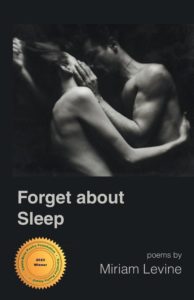 Review by Suzette Bishop
Review by Suzette Bishop
Miriam Levine’s Forget about Sleep, the 2023 winner of The Laura Boss Narrative Poetry Award, stays with you, unguarded, blooming, fragrant, rustling. Life on Earth is paradise. And it isn’t paradise. What do we do with that? Levine’s exquisite poem-blooms from the later stages of life answer that Eden’s promise isn’t artifice. There’s a chance to see, be seen fully, and see ourselves, “the lightest web of possibility / that I too may be seen clearly.”
Levine admits loving “bodily things,” grounded by home, place, literature, art, garden, and the objects she loves. The physical mapping of her life is recorded, crystalized moments she shares with us in a conversational voice, including the voice of other writers, particularly women writers, Mansfield, Rhys, Sappho, Dickinson. This guides us to paying closer attention to our own aliveness and its temporariness. Memory underscores this tension, and we might start near the present in a poem but slide into an entirely different decade (I love the time traveling that happens in this book). The conversational voice, present from the start with the book’s title and spoken by people from the poet’s early years, reminds me of my working-class relatives and their deep attachment to the material world, not taking hard-won things and elegant living for granted. Those roots keep the poet honest, direct, unpretentious.
The beauties of Eden stack up in Forget about Sleep: scarves; perfume bottles; live birds of all kinds; clothes; stunning sunsets, sunrises; color that moves us deeply, “a bolt / of color like sudden / memory”; delicate Rothko light shifts; flowers; and words. People materialize in dreams and memories, rendered with camera-precision, many in the glory of their youth. Coexisting with beauty in Forget about Sleep are temporal time, disappointments, failures, and aging. Powerfully, Levine comes to terms with aging, the temporariness of life, and loss. She finds humility, wisdom, even relief, and a continuation of sensuality, the “little frill of blackberry flowers” from the opening poem, where she affirms, we are “not done with love.” In “Coat of 1957,” Levine remembers her trench coat from 1957 and how she felt living in a younger coat-wrapped self, what Didion refers to as “How it felt to be me,” looking stylish but not always protected from the cold. Her current self imagines her dog jumping into her lap, staining the worn white coat, perhaps symbolizing being more comfortable with her older self. There is appreciation for the luxurious garment and younger self,
looking attractive,
my virgin body—
worthy, spotless,
diamond
bright,
but a sage humor about its impracticality and her changed perspective. Another poet in “Candle to the Flame” asks her why our species is here, and she answers, laughing, “’To read each other’s poems,’” then more seriously wonders, “aren’t we also here to sacrifice the candle to the flame and see light fade?” Seeing ourselves go out can bring humility, wisdom, trust, and faith.
People return to the poet in dreams, but they remind her life ends, may even be calling her to join them, especially the women in the poet’s life. In “Aunt Jen Speaks from the Afterlife,” Aunt Jen describes an enticing afterlife. Rather than visiting the poet, her mother eerily claims the poet is visiting her during “Kitchen Death Wish.” “‘Sit with me a while,’ she says, / but I stay upright,” and when the poet touches her, says, “`You’ve come.’” Levine resists crossing that threshold and wonders at how this younger version of her mother could have given birth to her, “Her bones are so small.” She movingly laments being born into “this cindery world,” that tension between living and being mortal starting at birth. No filmy ghosts float by in Levine’s poems, only fully visible, solid-seeming people, making their loss even more gut-wrenching, frightening. “The clear, clean light and scent of lilacs / make the fast-disappearing birds so // piercing now” from “Watching Birds” powerfully mirrors this phenomenon.
The objects, garden, and landscape surrounding the poet are what she returns us to, soothing the lingering fear that follows these dreams and memories of loss. Reading by lamplight, writing these poems, the poet works through fear until she asks in a poem title, “Why Should I Be [A]fraid?” The scarlet runner living in the poem persists and seeds, a generative image. In addition to poetry collections, Levine has written a novel and memoir and was a professor and chair of the English Department at Framingham State University. She was the first Poet Laureate of Arlington, Massachusetts.
Forget about Sleep by Miriam Levine
NYQ Books, The New York Quarterly Foundation, Inc., 2024,
$18.95 [paper]
ISBN: 9781630451110
Suzette Bishop has published three poetry books and two chapbooks, including her most recent chapbook, Jaguar’s Book of the Dead. Her writing has appeared in many literary magazines and anthologies and received an Honorable Mention in the Pen 2 Paper Contest sponsored by the Coalition of Texans with Disabilities, two top ten placements in the Northwind Writing Award, and first place in the Spoon River Poetry Review Editors’ Prize. She lives in Laredo, Texas.
